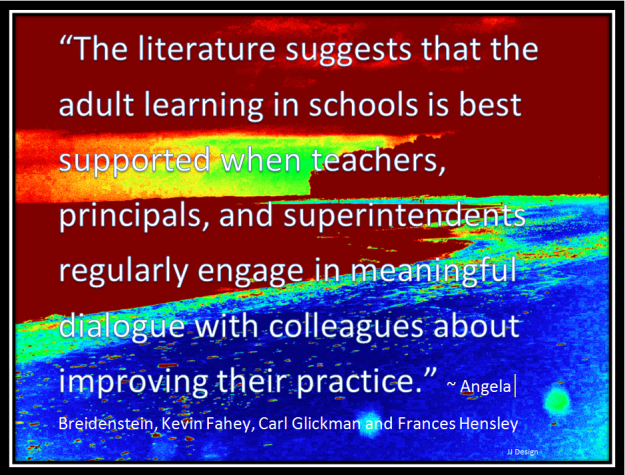If we care about the education of today’s youth it behooves us to take adult learning seriously. We adults can learn our way into the future or we can hold onto the status quo in our classrooms/schools or we can defer to the massive network of sales people promoting a multitude of educational products. I have faith in the people that went into a career of service as educators. My faith is based on my observation that educators are motivated to the future by serving today’s youth. Yet, today’s educators often hold tight to the status quo and their leaders have fallen into the trap of purchasing curriculum materials as the way to meet student’s learning needs. Neither the status quo nor products are going to lead to dramatically more students learning at significantly high levels.
There is a way to use the same positive energy that motivated people to become educators and focused that energy on reflective, collaborative dialogue and action around effective teaching and learning. This will require new learning on the part of many an educator.
It will require intentionality for the adults to learn, change and grow in ways that focus on effectively and demonstratively serving many more students at high levels. These adults will need to let go of efforts that don’t work and maximize efforts that do work. To discover what works means to be focused on process, relationships, presentation and very clearly on outcomes. And not just the outcomes of narrow test scores. Instead we will need to identify appropriate and useful knowledge, dispositional and behavioral outcomes that show the progress and development of our students.
The past and the present can inform our movement into the future, yet instead of moving forward; we often find that we are invested in maintaining the past. Figuring out why we, as a profession, are so slow to adapt and change can become an activity of ‘looking back’ when we need to be ‘looking forward’ to maximize the learning that can come from the resources invested in our learning system. So, as important as the ‘why’ might be – now is the time to focus on the future.
There is information from many sources pointing us in a very clear direction. The information is calling on each of us, whether we are teachers, principals, superintendents, board members or community members get much better at working collaboratively – we have much we can learn about the power of working together. We now have a “substantial professional knowledge base that highlights a strong connection between student and adult learning. Student learning increases in schools were there are educator communities that are reflective, collaborative, and focused on issues of teaching and learning. When adults learn from one another, student learning increases. Adult learning makes a difference.” Carl Glickman and others report this in their book: Leading for Powerful Learning: A Guide for Instructional Leaders which was published by Teachers College Press in 2012 (page 3).
On the same page they write that: “The literature suggests that the adult learning in schools is best supported when teachers, principals, and superintendents regularly engage in meaningful dialogue with colleagues about improving their practice.”
By making these statements the authors are referencing the work of many educational researchers and writers including: Bryk, Donaldson, Leithwood, Stroll, Guskey, Johnson, Kegan and many others from their varied works which were published between 1995 and 2010.
And as I write in The Power of the Social Brain: Teaching, Learning and Interdependent Thinking (Teachers Collage Press, 2013 page xi): “When people are good at thinking together, good things happen. There is a great need for adults to become more intentional and successful as interdependent thinkers and catalysts for helping students and others to gain these skills.”
When many adults are working together to discover ways to serve student learning we will find the audacity to break away from nonproductive elements of the status quo and we will know to not be influenced by the sales and promotional departments for commercial curriculum materials.

Thanks for sharing Jerry. Have you seen places where this is being embraced? Can we accomplish this in the time allotted by the current system. I agree that embracing teacher, principal and superintendent learning is the key to improvement and how do we accomplish this in the time bound culture that permeates education. For the adults to be learners we need to carve out the time to learn as individuals, partners, buildings and districts.
You are correct, Dave – time will need to be devoted to efforts like these. I don’t have a shining district to point to as a model. Maybe others will know of such a district. Yet, we need nodels. Maybe you and and your district can give us part of that model.
My wife’s school has led the area for PLCs. Their focused dialogue has been to improve student learning. The adults are learning about their effectiveness.
It is important work, Dan! All the best to your wife as she thinks with others!